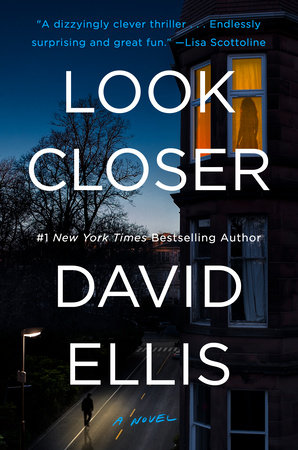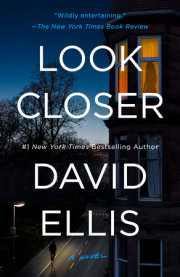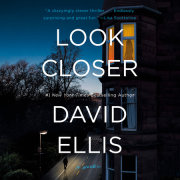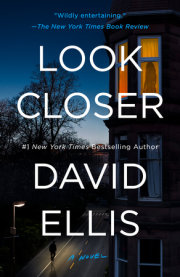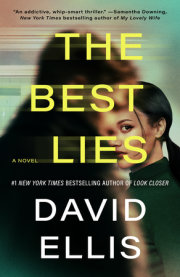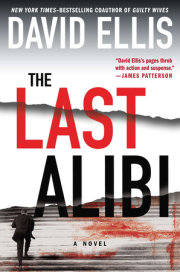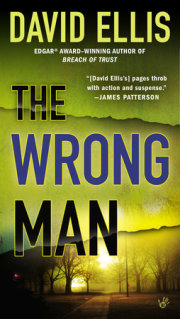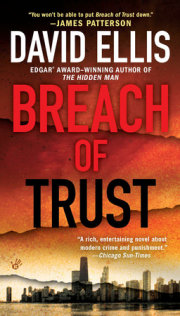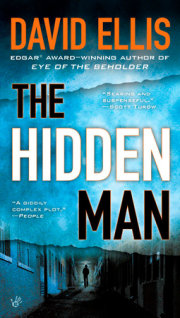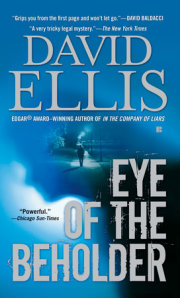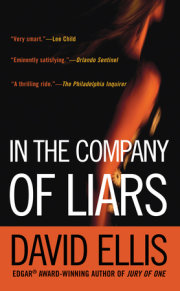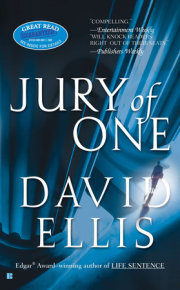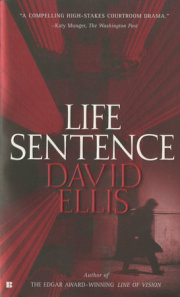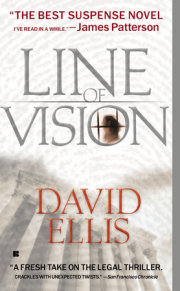1 Simon I check my green burner phone for the time. It's now 8:51 p.m., nine minutes to nine. Nearly two hours since trick-or-treating ended and Grace Village plunged into darkness, the residents of this bedroom community hunkering down for the night.
Police cruisers will be out tonight, but there are none currently on Lathrow Avenue, at least as best I can tell standing in Lauren's foyer, looking through the peephole of her front door with emotion clouding my eyes. Not tears. I am not crying. I thought it possible that tears would come, even likely, but they have not. Now I'm sure they won't. Tears are for sadness, regret, remorse.
I am not calm exactly, certainly not what I would describe as normal; far from that. A dull ringing fills my ears and the THUMP-THUMP, THUMP-THUMP of my pulse echoes through me, a bellowing bass drum no symphony orchestra could match. Still, my hand does not shake as I reach for the inside door handle, an ornate gold latch you'd expect to open a vault of princely treasures. But no jewels or riches beyond this door, only danger. I am not supposed to be here, inside Lauren's house.
I turn one last time and look behind me in the foyer.
Lauren's body dangles from the second-floor landing, her toes no more than a few feet above the marble foyer floor. She is motionless, coming to rest facing me, her head lolled unnaturally to the right, resting on the knotted rope wrapped around her neck, her head so askew it looks as if it might detach and fall to the marbled floor. She is wearing a skintight cat costume, complete with makeup, painted whiskers, and button nose; even the nails on her fingers and toes are painted black. Halloween Barbie, if there is such a thing, and I'm sure there is. Rising from the noose, the rope strains taut against the ornate wrought iron railing on the second story, overlooking the open foyer. Watching her, no matter how glamorous her looks, how sexy her outfit, conjures the image of a butcher's freezer, the slabs of beef hanging from large hooks in the ceiling.
Happy Halloween, Lauren.
I take a step forward but my boot crunches on a shard of broken glass from the bowl of Halloween candy shattered in the foyer. Whatever the reason I had for stepping toward her-one last goodbye? Replacing the heel that fell off her left foot?-I think better of it and turn to the door.
I pull down the latch and open the front door, the cool October air rushing into the space inside the hood over my head, which covers my face completely and blocks my peripheral vision. I forgot to check through the peephole again before opening the door. That was sloppy. This is not a night to be sloppy.
I walk through the empty streets of the village in my Grim Reaper costume, plastic shopping bag clutched in my left hand, passing skeletons hanging from trees, tombstones planted in front yards, orange lights illuminating shrubbery, ghosts frowning at me through windows.
My head buried inside this elongated hood, my height at five feet eleven, I could pass as a teenager trick-or-treating late (which wouldn't fly, given the village's strict curfew) or an adult leaving some kind of party (for which I can name no host or address). I should walk with a natural stride, like I haven't a care in the world, an anonymous man covered head to toe in a black robe and hood on the one night of the year that it wouldn't seem odd. Still, I should have an answer at the ready should a police cruiser stop by.
As a wise woman once told me: The best lies are the ones closest to the truth.
Walking home, I will say if asked.
Too much to drink. That will have to do. The drinking part isn't true but hard to disprove. The walking home part is close enough. I'm walking in that direction, at least.
So on I walk through the square grid of the small village, reaching the park on the southeast end of town, crossing the diagonal path, passing some homeless people, swing sets, and jungle gyms, a pack of teenagers huddled on the hill with beers they try to conceal. I put one foot in front of the other and try to act normal and think about normal things. It's been a long time since I've thought about normal things.
I haven't felt normal since May 13.
I play the game of what-if. What if I hadn't gone to get my haircut on May 13? What if the dean hadn't called me to his office, delaying me? Ten, fifteen seconds' difference, and I might never have seen her. I wouldn't have known she'd come back.
But that doesn't calm me, so I think about what happens next. My journal. My journal with the green cover, to match my green phone. I got rid of that journal, right? Burned it to a crisp, to a heap of ash in my fireplace. Right? I didn't just dream that, did I? If the police ever got their hands on that green journal, it would be game, set, match.
That's not helping stress levels, either, so I try the language games I used as a kid to calm my nerves, to slow me down when I was freaking out, like how the word "fridge" has a "d" but "refrigerator" does not; how "tomb" is pronounced
toom and "womb" is pronounced
woom, but "bomb" is not pronounced
boom; how "rough" and "dough" and "cough" and "through" should rhyme but don't. I don't know why oddness and contradiction calm me, but they always have, maybe because of their familiarity, because I see so much of those traits in myself.
Then I stop. My legs suddenly, inexplicably no sturdier than rubber, exhaustion sweeping over me, my pulse ratcheting up again, vibrating in my throat. Only steps away from Harlem Avenue, only moments from crossing the town border, only a matter of feet from leaving Grace Village and crossing into its sister town Grace Park, where I live, a far bigger town.
I manage to duck behind the equipment shed owned by the park district. I plop down on the ground, pull off my hood, remove the head mask I'm wearing, and rest my sweaty head against the brick wall. I fish around in my bag for the knife. It's a large knife that we used to slice the Thanksgiving turkey when I was a kid. I thought I might need it tonight.
I pull out my green phone and start typing:
I'm sorry, Lauren. I'm sorry for what I did and I'm sorry you didn't love me. But I'm not sorry for loving you like nobody else could. I'm coming to you now. I hope you'll accept me and let me love you in a way you wouldn't in this world. When I'm done, I put the phone in my lap, next to the knife. I hold out my hand, palm down, and stare at it. It remains utterly still and steady.
I take a breath and nod my head. I can do this. I'm ready.
Before Halloween May 13 2 Simon "You know what your problem is?" Anshu says to me, though I didn't ask him. If we're going through a list of my problems, we'll be here all afternoon. "You don't look the part," he says, without waiting for a prompt from me.
"I don't..." I give myself a once-over, my button-down oxford and blue jeans. "What's wrong with how I look?"
"You dress like one of the students. You're supposed to be the professor."
"What do you want, a tweed coat with patches? Should I carry a pipe, too?"
I'm sitting in my office on the third floor of the law school with Professor Anshuman Bindra, who looks the part naturally, with his owlish face and trim beard, hair the consistency of a scrub brush, which manages to not move but look unkempt regardless. Anshu leans back in his chair. "Simon, my friend, you just got quoted in a U.S. Supreme Court opinion. It's like the Supremes collectively leaned over from Washington to Chicago and whispered to the committee, 'Make this guy a full professor.' You should be walking tall today. You should be the new King of the Fourth Amendment. But instead, you show up looking like you're going to a frat party."
"It shouldn't matter how I dress. It's what I say, what I teach, what I write, that-"
But he's already making a mouth out of his hand, yada yada yada. "Now Reid, he looks the part. He wears a sport coat and dress pants every day."
Reid Southern? That guy is to academia what Pauly Shore is to dramatic acting. He has parents with pull, and that's it.
"He wears a sport coat because his stomach hangs over his belt," I say. "And he probably can't fit into jeans."
Anshu drops his head, pinches the bridge of his nose. "Yeah, and you run marathons, and half your students probably want to bone you, but Reid looks like a law professor. He acts like one. The guy listens to Mozart in his office. You listen to REM and N.W.A. and Panic! at the Disco."
"Okay, first of all," I say, leaning forward, "I do not and would not listen to Panic! at the Disco. And now it matters what music I listen to?"
"It's not one thing. It's the whole package. The... grungy look, the music, the whole attitude. You don't think appearances matter? I know they shouldn't, but you know-"
"No, they do, I know." But I'm not going to change for them. Why should I? There's no dress code here. I'm twice the teacher Reid Southern is. His students hate him. I've read the reviews. And his scholarship is pedantic at best. He's writing about a different way to understand mutual consent in contract law. I'm writing about the government violating the constitutional rights of its citizens on a daily basis.
"You're too self-deprecating, while we're at it," says Anshu.
Sure, why not, let's keep going.
"You'd rather I was pompous and self-congratulatory? Anshu, jeez, you're undoing everything my mother taught me."
He flips his hand at me. "What did you just say to Loomis in the hallway? The vice-chair of the damn tenure committee compliments you on your article getting cited by the Supreme Court and what did you say?"
"I don't know, what did I say?"
"You said, 'Must have been a slow day at the Court.'"
Oh, yeah, that's right, I did.
"I mean, how about thank you?" he says. "The highest court in the land just cited one of your articles. Can't you bask in the glow just a little? But no, you can't take the compliment. You have to tear yourself down. And Reid doesn't have a blog," he adds.
I open my hands. "What's wrong with my blog?"
"You make jokes," he says. "You crack wise."
"And I talk about judicial decisions and whether they're right or wrong."
"You wrote a limerick about the chief justice of the United States."
"Yeah, but it was funny."
"I know, but you're so... so casual and irreverent."
"You mean I'm not stuffy? I don't use footnotes or Latin words? You know how I feel about footnotes and-"
"Yes, I know how you feel about footnotes." He reaches out with his hands, as if beseeching me. "But law professors use footnotes! Law professors use Latin!"
I'm not doing it. I'm not changing how I dress and I'm not sucking up to the faculty at poker games and cocktail parties and I'm not using Latin words and I sure as shit am not using footnotes.
Okay, it's not quite Roosevelt charging up San Juan Hill, but I'm taking a stand.
"Get the spot first," he says. "Once you're a tenured full professor, challenge every convention of academia. But this whole laid-back thing..."
I'm not laid-back. I'm anything but laid-back. I'm stubborn. There's a difference.
"Here's some Latin for you," I say. "
Ego facturus est via mea."
Anshu sighs. "Now I suppose you're going to tell me what that means."
"It means, I'm going to do it my way."
"Of course you are." He flips a hand. "Of course you are."
"Now if you'll excuse me, Professor, I need a haircut."
"That was on my list, too. Your hair's too long. You look-"
"Like one of the students, I know."
And then my phone rings.
Not five minutes later, IÕm entering the office of one of the associate deans, Martin Comstock, who also happens to be the chair of the tenure committee. Silver-haired and dapper, going all-in on the stereotype with the bright red bow tie.
Actually, he wears bow ties so people will ask him about it, and he can
reluctantly reveal that he clerked for U.S. Supreme Court justice John Paul Stevens, who wore bow ties, and then served as an aide to U.S. senator Paul Simon, who also wore them.
Oh, this? Well, I suppose it's kind of an homage, if you must know... Our dean is retiring next year, and everyone says Comstock will take the reins. Not everybody's happy about that. I might be one of those people. He's a politician, not an academic. A blue blood, not a scholar. He's everything I hate about academia.
Other than that, I'm sure he's a great guy.
"Ah, Simon, good," he says, when I knock on his opened door.
"Hi, Dean." He likes being called by his title. He pretends he doesn't, but he does.
He manages a quick, disapproving appraisal of my outfit. For the record, my button-down shirt is tucked in, and my jeans are clean and not torn. I look just fine.
"Thanks for stopping by," he says. "I'll get to the point."
His office, all leather and walnut, is a monument to his greatness, with all his diplomas and awards, photographs with presidents and high-court judges. He sits in a high-back leather chair behind a magnificent desk.
"Simon, you applied for full professor," he says, his hands forming a temple in his lap.
"I did, yes."
"Yes, good stuff, good for you," he says. "You've done fine work, I'll say it to anyone."
It's time for the
but... "Now I don't want you to take this the wrong way, Simon."
In the history of mankind, nobody has followed
I don't want you to take this the wrong way with something that could be taken any other way.
"I wonder," he begins. "Well, here. You may be aware that Reid Southern has applied for the position as well."
I sure am! I’m also aware that his daddy has given over $5 million to the school over the last decade, which just happened to coincide with when his son started working here.
"Yeah," I say.
"And Reid, I’m sure you’re aware, has been here a year longer than you."
"I’m aware of that. And I’m aware that you’re only granting one position."
"Just so, just so," he says, so eager and condescending that it feels like he might toss a dog treat into my mouth. "And, well, this is delicate, but you can probably imagine that Reid has a fair level of support. You know how these things go—it’s his turn."
Plenty of associate professors have been denied a full professorship. We don’t tell people it’s
their turn. Not unless their father is a walking ATM.
"I would just hate...."His fingers work the air, like he’s trying to capture just the way to put it, like he doesn’t have this speech prepared. "I think it might be preferable for you if you waited until the next opening. Then you’d be applying without the mark of having applied once and been denied."
"You think I’ll be denied." I don’t say it as a question. But it
is a question, I think. There are some old-school, clubby types who probably don’t take to me, but there are plenty of good, non-political people here, like Anshu, who think that quality teaching and standout scholarship are what matters, not how you dress or who you know.
"Well, obviously, it’s nothing that committal, but as I say, Reid does enjoy substantial support. Not that anyone remotely questions your scholarship, Simon. You’ve done fine work."
Right, you’ll say it to anyone.
"You’ve given me a lot to think about, Dean," I say.
I leave the office, so he can pick up the phone and call Reid’s dad and tell him that he had
the talk with me, and things are going swimmingly.
Now I’m late for the haircut. I usually walk, as it’s only a few blocks away. Instead I head out the Superior Street side and into the outdoor faculty parking lot. I usually get here earlier than others and park in one of the front rows.
I find the silver Mercedes coupe and pull out my key. After a glance around, I run the key along the side of the car, a hideous scrape across the driver’s side panel.
Sorry about that, Dean.
Now for that haircut.
Copyright © 2022 by David Ellis. All rights reserved. No part of this excerpt may be reproduced or reprinted without permission in writing from the publisher.

